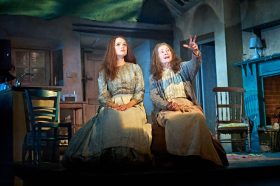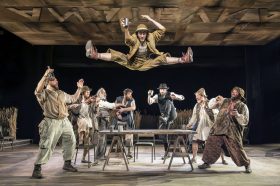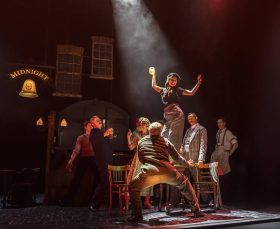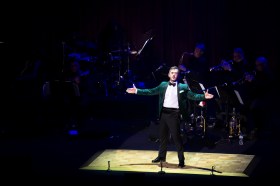In November of this year, venues in London and Kent will play host to BACHFEST UK; an annual homage to the genius of composer J. S. Bach. The series was founded in 1990 by Margaret Steinitz and was originally called the London Bach Festival. The event aims to enhance and develop the work of the late Dr Paul Steinitz who in 1946 originated the London Bach Society. Each year the series selects a theme and this year it is set by the fascinating question: ‘J S Bach and Martin Luther: Obedient Servants or Enlightened Masters?’ It is widely know that these men, although separated by almost two centuries, both attended the same school in Eisenach. Bachfest explains the theme in their publicity information:
‘The inspiration for this comes from a remark attributed to the founder of the Lutheran Church that music is a beautiful and gracious gift from God to be encouraged both in the church and in the home and we have striven to interweave this in some way through each event.’
The musicians taking part play an integral role in the planning and promotion of this annual series and the accent is on excellence and the creation of opportunities for young talent, this year Gillian Keith (soprano) winner of the Kathleen Ferrier Award 2000 will be taking part. Alongside such opportunities, the society has championed many of the lesser performed Bach works. Over a period of 30 years Steinitz oversaw the public performance of all 208 of Bach’s extant cantatas and presented probably the first performance in England of the St. Matthew Passion, in its entirety and original language, in 1952 at the Priory Church of St Bartholomew-the-Great in London.
Featuring prominently in the series will be the Steinitz Bach Players, founded in 1968 as a professional orchestra to complement the existing amateur choir. Their work was controversial and pioneering as they gradually instituted the use of appropriate instruments of the period together with an appropriate style of playing them; they introduced a new approach to the art of playing secco recitatives that has become standard practice.
And what of Martin Luther? The same school and a passing remark about music may seem to the uninitiated a tenuous link for a theme, however the two men shared not only their school but their faith and a passionate belief in the power of music for the worship of God.
Martin Luther, although attributed with launching the Protestant Reformation, was a reluctant revolutionary. He was a scholarly, deep thinking man and was not alone in questioning the politics, corrupt morals and finances of the Holy Roman Church during the 15th/16th Centuries. It was the arrival in Wittenberg of Johann Tetzel from Rome, selling indulgences, (essentially pardons from the Pope to allow entry to heaven) which spurred him into action. With the intention of opening an avenue of discourse on this practise, he nailed his now famous ‘Ninety-five Theses’, essentially his objections, contained within a paper written in Latin, to the door of the church in Wittenberg.
One careless translation of his note into German, some rapid word of mouth and a long period in hiding, during which Luther translated the Bible into German, led to support from the nobility and middle classes in Northern Germany for the establishment of a separate and distinct Protestant Church in Germany; a church tradition that Bach grew up with.
Luther went on to make significant contributions to the reformation both theologically and musically. He was an accomplished musician and singer himself and he wanted a fully inclusive Mass and worship through use of German alongside (ideally instead of) Latin and for the music not always to be reserved for highly skilled musicians, ‘the importance of the individual and his salvation formed the basis of all of Luther’s writings and his musical reforms also stemmed from this same frame of reference.’ (1)
Through his compositions, adaptations of existing works and employment of new composers, Luther increased his use of music in the Mass and ‘established the practice of congregational singing of the Mass as a regular means of worship’(1). In his 1523 ,i>Formula Missae, ‘he called upon the poets and musicians of the church to enlarge the scanty store of good German hymns’(1). (Quotes marked (1) Charles K. Moss.)
Bach has an impressive canon of secular work, notably the Brandenburg Concertos but his output of religious music was prolific and we know that many of his cantatas are based directly on Luther’s chorales; Walter P Snyder has examined Bach’s life, works and faith and poses the question: was Bach a champion of Lutheran orthodoxy? It is worth noting here that during Bach’s lifetime, Lutheran orthodoxy was not the majority view, Pietism was taking over and Bach’s close adherence to ‘pure’ Luther would have been courageous. Snyder presents much evidence of Bach being a serious student of Lutheran theology, reminding us that Bach wrote an intensely scholarly commentary to Luther’s bible (The Calov Commentary) Snyder concludes:
‘In him we see a true balance found by few. Without sacrificing any area, Bach excelled in Piety, Rationality and Orthodoxy. Each shaped the others, and all were normed by his love of making music, and his love of Jesus Christ’.
Bachfest UK ’04 invites you to celebrate the sublime beauty of Bach’s music and the integral part that religion and Martin Luther played in this. Amongst the many highlights will be the Grove Forum Lecture, delivered by Professor John Butt (Glasgow Univ.) who will examine the differences and similarities between Lutheran and Roman Catholic liturgies, together with a consideration of some of the political implications of the two confessions in Bach’s environment: ‘Bach and the Lutheran Mass: Servant of Tradition or Master of Music?’ This will be followed by a performance in the concert hall that includes the Lutheran Mass, 4th November 2004.
To emphasise further the Luther theme, the series’ feature event, Bachfest Day is to be held on Sunday 7th November at the Dutch Church. It will include cantata, BWV 125 ‘Mit Fried und Freud ich fahr dahin’ (‘In peace and joy I now depart’) from Bach’s second cycle of cantatas with text based on Luther’s setting of the Nunc Dimittis, sung by Clare College Chapel Choir Cambridge, directed by choral specialist Tim Brown. This cantata, performed in the context of a Protestant Service, will create something of the atmosphere of the Thomaskirche and Nikolaikirche (Leipzig) where so many of Bach’s cantatas first saw the light of day. To complement the Cantata will be Brahms’ motet ‘Warum ist das Licht gegeben’ from Op.74, which includes his setting of Luther’s hymn ‘Mit Fried und Freud ich fahr dahin’.
From the outset of the London Bach Society it was clear that Dr Steinitz’s long-term goal was the performance of Bach, ‘in its original form.’ Today in the annual Bachfest UK series the choirs used are small and professional, the orchestra plays on period instruments and this country’s close ties with the Continent are marked by the presence of eminent musicians such as Gustav Leonhardt. The participation of young performers reflects Dr Steinitz’s long association with students and his widow Margaret’s determination to persuade a new generation of Bach’s greatness.
For full details of Bachfest UK ’04 which runs from 2nd –13th November 2004 see: www.bachlive.co.uk




